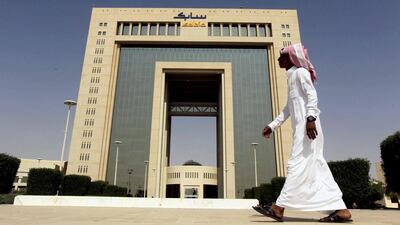Saudi Basic Industries Corporation, the Middle East's biggest chemicals manufacturer, reported a 17 per cent annual profit increase for 2018, although fourth quarter net profit declined as the average cost of its products fell.
Full-year net profit rose 17 per cent to 21.54 billion Saudi riyals (Dh21bn), Sabic said on Sunday in a statement to the Saudi stock exchange, where its shares are traded.
The company missed the mean estimate of 23.67bn riyals of analysts polled by Bloomberg.
Fourth-quarter net profit also missed analysts’ estimates, declining 12 per cent year-on-year to 3.24bn riyals.
Full-year revenue rose 12 per cent to 169bn riyals, in line with a 169.68bn riyal average Bloomberg estimate, while fourth quarter sales fell 8 per cent year-on-year to 40.13bn riyals.
“The decrease in net income is attributable to lower average selling prices and decrease in share of results of associates and joint ventures,” said Sabic. The lower income is also attributed to an increase in the costs of selling, and general and administrative expenses.
Saudi Aramco is in talks to buy a 70 per cent stake in Sabic as the world’s biggest oil producing company seeks to diversify its business before its planned initial public offering. In particular, Aramco wants to expand its downstream business to extract more value from its crude grades, and says a tie-up with Sabic would help it to achieve its goal.
The pair have already begun to collaborate on projects. In November, Sabic and Aramco selected Yanbu, on the west coast of the kingdom, as the site to set up an integrated industrial complex to convert crude oil to chemicals.
The complex is expected to process 400,000 barrels per day of crude, in turn producing around 9 million tonnes of chemicals and base oils each year.
Revenue from the GCC chemicals sector rose by 17 per cent year-on-year to reach $84.2bn (Dh209.3bn) in 2017, as regional national oil companies added capacity and investment to expand their downstream sectors, according to the Gulf Petrochemicals and Chemicals Association, the sector's regional representative body.
Sabic is eyeing investment opportunities in China, its chief executive Yousef Al Benyan said in October.
The company is also expanding in the United States. Earlier this month, Sabic signed a preliminary agreement with South Louisiana Methanol to explore the possibility of developing a chemicals plant in the North American state, to capitalise on profit from surging shale gas production.
Sabic is rated A1 by Moody’s Investors Service, A- by S&P Global Ratings and A+ by Fitch. All three have also granted the company stable outlooks.

